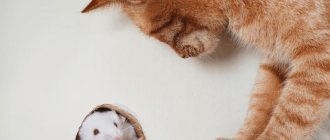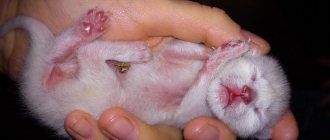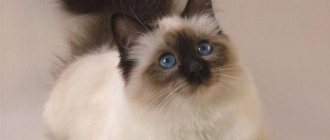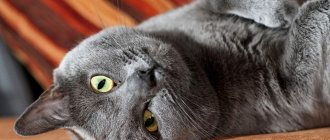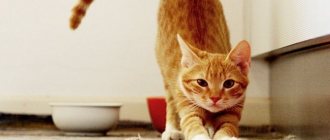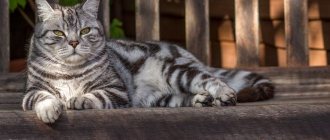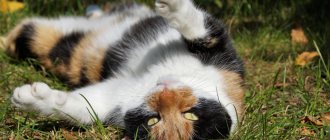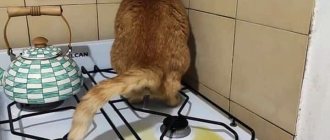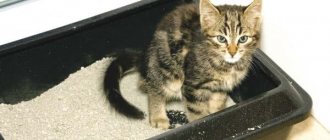Varieties of Maine Coon crosses with other cats
With a Siberian cat
Siberian cats are stockier, have a short neck, soft, long, uniform hair, smooth muzzle lines, and ears tilted forward.
Maine Coons have an elongated body with a longer neck and have an elongated muzzle with a well-defined chin, ears vertical to the head and have tufts. Metis will be larger than the Siberian, but smaller than the Maine Coon. Some may have tassels on their ears. The coat is often Siberian or intermediate. Possible presence of a long tail, rare. Usually quite effective. The character is simpler than that of Maine Coons, which makes them easier to keep.
With an ordinary cat
The most common crossbreed. Such mestizos are usually larger than barn cats. Color is also often transmitted. There are no tassels on the ears. Tail length is not usually passed down from Maine Coons. The coat is usually not Maine Coon - much shorter, which is more convenient to maintain. In general, it resembles an ordinary cat, only larger.
With Scottish Fold
Osteochondrodysplasia is a malformation of cartilage in Scottish Fold cats and their mixtures.
It manifests itself as deformation of bone and cartilage tissue on the paws and tail. This disease is incurable and is noticeable only closer to the age of one year.
As a result of mixed genes, kittens are often born that have serious health problems, namely pathologies in the structure of the musculoskeletal system.
In addition, the mestizo looks unsightly - the kittens born from such a union have poor hair and are smaller in size.
With a British cat
Also a common cross. The shape of the head is practically not inherited from the Maine Coon. There are no tassels on the ears either. The coat is short. He just turns out to be a very large Briton.
With the Sphinx.
A very uninteresting mix. Lack of fur is not transmitted. Strong splitting of signs towards a yard cat.
Positive qualities of cats
You often hear that mixtures of varieties or unspecified cats are smarter and tougher than purebred couch sissies. This is partly true, because... these cats receive a set of genes from which they take the most useful qualities for survival in nature.
Mixed breeds of big cats or exotics look very attractive and unusual, combining the size, grace and unusual features of several breeds.
The character of an animal depends not so much on the breed, but on upbringing
It is still better for cat owners to remember that the character of an animal depends not so much on its breed, but on upbringing and care.
Mixed cats are subject to mandatory neutering before or after they reach the age of sexual maturity. No matter how beautiful such animals look, they cannot be bred in the same way as “pet”-class and “culling” cats.
What happens if you cross a Sphynx with an ordinary cat?
Outbred genes will affect the exterior of the animal: such cats will be covered with short hair, which can be continuous or localized. The appearance of mixed-breed cats does not detract from their attractiveness, and their character will be proud, characteristic of sphinxes.
Important! The difference in hairlessness genes depends on the breed: in Canadian Sphynxes the genes are recessive, that is, they do not appear in a heterozygous state, while in Don Sphynxes they are dominant.
Mixed-breed cats, obtained from a mixture of the Don and the Canadian Sphynx, look the same as a cross between a Don and a regular cat. Kittens covered with hair will carry the hairless gene, which may appear in subsequent generations.
Mixed breeds cannot be animals of the same breed that have been culled. Such cats do not have a pedigree, but they remain representatives of the species.
Sphinx - price and how to buy correctly
The cost of a Sphynx depends on many factors, in particular the pedigree and the cost of mating the parents. Therefore, sphinxes cost from 5 to 100 thousand rubles. It is best to choose Sphynx cats in nurseries, where breeders can provide documents for each kitten. Otherwise, a Sphynx purchased from unknown breeders may turn out to be pathologically ill.
Check out the breed standards and choose which Sphynxes interest you most. Kittens must strictly meet these standards.
Also decide on the purpose of buying a sphinx, since they are divided into several categories:
- Pet class cats are suitable for keeping at home. They were purposefully bred as pets and require a minimum of care;
- Show class cats are suitable for those who want to attend competitions with their pet;
- There are also cats with slight deviations from the norm - they are suitable for novice breeders who want to get productive offspring.
When choosing a kitten, you should pay attention to its behavior, and not just its appearance. Sphinxes are affectionate, playful and active, they willingly meet new people halfway
If you see a kitten being aggressive, hiding, or sitting still and not showing interest in its surroundings, then there is something wrong with that kitten. In order to choose a kitten, it is worth visiting the breeder more than once, while observing the kittens.
The kitten should not have watery eyes, dry skin and, especially, no signs of dermatitis. He should be well-fed, but not too fat. You should not buy a sick animal out of pity.
The Sphynx is an elegant cat that combines a keen intelligence, curiosity and a desire to communicate with people. They make excellent pets, get along well with other animals and get along with children. By getting yourself a sphinx, you make an affectionate friend who will always be glad to see you.
Mixture of a sphinx and an ordinary cat
Mixed breeds do not call any particular breed of cat, but the offspring of animals of two different breeds. All outbred cats are inherently mestizos.
It happens that during a heat, a Sphynx cat took a walk with an ordinary cat - the owners did not notice. Or the sphinx boy fell in love with a non-prestigious “mongrel”. Interbreeding is often an accident; such matings are almost never organized purposefully.
Mixed breeds inherit a certain set of parental genes, and each kitten from the same litter has a different set of genes. If at the birth of purebred kittens a predominance of hereditary characteristics is expected, then a “batch” of newborn mestizos can surprise with its diversity.
As a result of a mixture of a Sphynx and an ordinary domestic cat, one mother can simultaneously give birth to:
- completely hairless kittens;
- ordinary, shaggy;
- with short “velor” fur;
- “combined” - with partial coat, sometimes in very unexpected combinations.
With age, the presence and location of fur on a cat's body may change. For example, a hairless kitten may acquire “pants” or “whiskers” upon reaching puberty. And it happened that shaggy cats completely lost their hair by the age of one year.
With age, only body structure and appearance do not change. A kitten from a mixed litter can inherit different genes from both parents: for example, the appearance (huge ears and eyes of a sphinx) from one, and the nature of the coat (the smoothness or fluffiness of an ordinary cat) from the other.
The appearance of mestizos can be unusual and even funny. However, there are frequent cases of the birth of rather scary, sometimes repulsive kittens. It’s good if kids take the best qualities from their parents: beauty, intelligence, endurance and good health. But if it’s the other way around, few people will want an ugly and angry pet.
British mix
As part of breeding work, planned matings between representatives of different breeds are allowed. This is done in order to obtain a new branch with certain specified parameters. For example, breeders want to get a smart, intelligent (like the Sphinx) and beautiful aristocrat (like the British). Such experiments may be planned or random.
It does not always turn out that the offspring of a mixture will display exactly those qualities of the breed that the breeder wants to consolidate. Hereditary factors are of great importance. Both Britons and Sphynx cats are prone to cardiomyopathy, a heart disease. If this quality is passed on to the offspring from both parents, the kittens will not live long.
There are examples of successful mating results between Sphynxes and British Folds. The kitten inherited its appearance from its British mother, but the fur was similar to mink fur - soft, shiny and short. He took after both his parents in character. The result was something between the sociability of a Sphinx and the independence of a Briton.
A case of the birth of a mixed-breed kitten from a Sphynx and a British Shorthair is described. He looked neither like his mother nor his father: without obvious standard breed characteristics, but with long, silky, curly hair.
How to choose the right kitten
In order not to make a mistake when choosing a pet, it is not enough to listen only to your inner instinct. Experts advise following the basic rules:
- Ask the breeder about all the offspring to determine whether the kittens are suitable: where they grew up, what their character is, whether they were examined by a veterinarian, whether the kittens were picked up after two weeks of age.
- Have any preventive treatments and vaccinations been carried out?
- First look at mom.
- If the kittens are from a nursery, then you should find out as much as possible about the parents.
- You should not take obstinate representatives who hiss and scratch.
A healthy animal can be identified by the following signs:
- clear eyes without discharge;
- clean area under the tail;
- shine of wool;
- absence of bloating - the first sign of helminthiasis;
- energy and curiosity;
- communication with brothers;
- fearlessness.
Any kitten - purebred, mestizo or mongrel - can become the best friend and companion. He will reciprocate the sincere love and care of the owner. You should not chase expensive, fashionable and purebred cats; it is better to bring into your home a faithful and devoted companion who will not leave you in difficult times and will brighten up the melancholy of gray everyday life.
Care and maintenance
To properly care for a mixed-breed cat, you need to know what breed its parents were. This will help you better understand the conditions of detention, taking into account all the nuances that arise. The basic rules of care remain standard:
- Choosing a balanced diet for your cat.
- Carrying out mandatory hygiene procedures, cleaning teeth and ears once every 10–14 days.
- Flea inspections.
- Taking medications for internal parasites.
- Preventative visit to the veterinarian.
- Sterilize the cat if necessary.
How to determine the character of a cat depending on their breed?
2 Category: Cat Psychology Wait
British cat character
Thanks to excellent genetic heredity, this breed is distinguished by its good health, in addition, such animals get along well with humans, including other pets that may be in your home. Although such a cat will always feel like a leader. A British cat will under no circumstances impose her company, although she will gratefully accept your affection. In general, the character of this breed is very pleasant, such cats always behave intelligently, they are very curious and sweet. At the same time, cat girls are very shy, and boys are calm. The most interesting thing is, despite the fact that such cats get along normally in society. They can also feel quite comfortable alone.
Personality of the Siamese cat
It is very interesting that such Siamese guts are very distinguished by their obstinate and rather unusual character. A distinctive feature is that this breed is independent, besides, Siamese cats are real hunters, and their hot temperament once again emphasizes their stubbornness. There is also an opinion that Siamese felines can attack their owner at any time, while they are very jealous and insidious, completely unfaithful and disobedient. But this is not at all true, such cats love people very much and their main character trait is a strong attachment to their owner. And if you wrap your pet in warmth and affection, he will pay you back in kind.
Scottish cat character
Despite their appearance and common origin, all Scottish cats are very different from each other. Some of these representatives are affectionate cats, while others, on the contrary, are aggressive. There are also cats that are very active and inquisitive, and there are also those that are very slow and calm. But it is very difficult for such cats to get along with other animals. These pets have a very well developed sense of independence, although raising such animals can be difficult.
Personality of the Bengal cat
Such cats are very similar to wild ones, although on the other hand they easily make contact and are considered very soft animals. By nature, they differ from other breeds in their cunning and intelligence; they are quite mobile and active, even at a more mature age. In addition, this breed simply loves to swim and bask in the water.
Character of Siberian cats
The Siberian cat has a fairly independent character and hunting traits, she has a well-developed instinct, she is affectionate, friendly, active and playful, she will respond with love to all your caresses, but she also has restlessness. This breed can be friends with dogs and get along well with them. The Siberian cat is very smart and intelligent, and by its nature is amenable to learning and training. Therefore, such pets are very smart. Siberian cats do not like to sit on hands and laps, and they very rarely vocalize.
Description of the breed
Some people confuse Don Sphynxes with Canadian ones, but these are completely different breeds (Canadians are never born hairless, and they always have fur on their tail, face and paws).
Dons have a large wedge-shaped head with pronounced cheekbones and brow ridges, slanting almond-shaped eyes and huge, wide-set ears, slightly rounded at the ends. The body of such cats is strong, muscular, with a wide chest, a pronounced inguinal line and a long flexible tail. A special feature of the Don Sphynx is the long toes on the front paws, which he moves in a funny way, but the mustache may be completely absent.
The main calling card of the Dons is their fur, or rather, the almost complete absence of it. It is by the presence of a “fur coat” that sphinxes are divided into four types: flock (the fur is present in the form of a “spray”, and the kitten itself resembles a peach to the touch; such fur disappears with age), brush (kittens are born with sparse hairs that gradually fall out, but may remain), velor (soft fur can be seen, especially the long “vegetation” on the paws) and bare-born (they are also sometimes called “plasticine”: there is no hair at all, and the cats themselves have hot, slightly sticky skin with many folds). The “nude” color can be any: gray, red, white, blue, black, and for girls, tortoiseshell. The skin itself is elastic, wrinkled, with a large number of folds in the groin, armpits, neck and muzzle. Do not worry that your pet has a fever - the average body temperature of a sphinx is about 39.5 - 40 ° C - he is always hot and wet from sweat.
Character
Despite their very unusual appearance, Dons are one of the friendliest and most loyal cats in the world. They simply adore their owner, preferring to lie on his lap for hours, and can become very offended if they are not given due attention. Many Sphynx owners jokingly call them “kissing” cats, but note some intrusiveness. Despite their touchiness, sphinxes are forgiving and gentle, so they are unlikely to sharpen their claws on your favorite sofa if they are suddenly left alone for a long time.
Don Sphynxes get along well with other pets, and especially with small children. They will play happily, rush around the rooms, turning everything that comes under their paw into a toy, so remove small and fragile objects away and shorten curtains and tablecloths hanging to the floor.
Care and maintenance
The main difficulty in caring for a don is satisfying his need for perfect cleanliness. A cat will not even come within a meter of its litter box if it even remotely emits “odors,” and will never eat from a dirty plate. It is good to use wood filler to fill the tray, and to ensure that no odors remain, use a special deodorant for cat litter, which is also sold at a veterinary pharmacy.
Also, be careful when choosing a sleeping place for your kitten: due to the lack of a warm “fur coat,” the pet may freeze and catch a cold, so keep it away from windows, doors and drafts.
And although the Sphynx does not need to be combed, it must be wiped every day with a damp cloth or a special lotion from the veterinary clinic. The main condition is that they are hypoallergenic and do not contain alcohol. The fact is that hairless cats sweat a lot, which can cause their skin to become covered with unsightly brown spots. Once a week, the cat should be bathed using a neutral pH shampoo and thoroughly washing all folds.
One of the weakest points of the Don Sphynx is their eyes, because they completely lack eyelashes, and kittens are born sighted. Once or twice a week, wipe your eyes with chamomile infusion and carefully monitor their condition. The same applies to the ears - regularly clean them of dirt and wax, and carefully trim their nails every two to three weeks.
As for nutrition, sphinxes have no problems with this - they eat absolutely everything. Breeders recommend feeding cats with ready-made professional food, balanced in the content of minerals and vitamins. However, if you decide to feed your pet natural food, then choose lean meats, such as beef or rabbit, pre-boiled or frozen. Twice a week you can give sea fish, egg yolk and fermented milk products, such as cottage cheese or kefir. To provide your pet with fiber and carbohydrates, give him boiled buckwheat and rolled oats, as well as boiled beets and carrots.
Nutrition
When choosing a diet, you must also focus on the characteristics of the breed. The good appetite of purebred Sphynx cats is associated with their high heat exchange due to the lack of fur. Mestizos retain the same habits if they have wool, so the principles when choosing food will be the following:
- Food for a pet must be special; cats are not fed what humans eat. The ideal option would be special dry and wet food for Sphynx cats with special additives.
- It is allowed to include boiled meat, vegetables, low-fat cottage cheese and milk into the diet.
- Drinking water must be clean, non-carbonated and non-chlorinated.
- The bowl should not be filled to the brim so as not to tempt your cat to overeat.
- The dishes from which your pet eats must be disinfected or boiled once a week.
Caring for mixed-breed cats is not difficult, but should be based on knowledge about representatives of crossed breeds. Maintaining good hygiene and choosing a balanced diet will help your pet delight you for many years with its activity and affectionate purring.
Source
Best breeds
Obviously, not all cat breeds correspond to the hunting description given above. In addition, it is rare that any breed includes all characteristics without exception. At the same time, there are certain types of four-legged furry pets that cope better than others with catching rodents. Let's look at the main ones.
Maine Coon
The breeding of such a breed is largely due to the presence of hunting skills in the animals. Initially, they served as a kind of hunters, protecting grain warehouses from unwanted attacks by rodents.
Representatives of the Maine Coon breed are distinguished by a high level of mobility. In addition, they are resistant to external environmental conditions, so they can hunt rodents in any weather. Animals are also distinguished by a certain excitement: when they see a mouse, they will watch and track it for a long time - until they catch it.
Another important characteristic of the breed is the fact that its representatives have quite impressive sizes. In this regard, they are able to catch even large rats
Russian blue
Smoky-colored cats have an absolute advantage - they are able to move smoothly, but at the same time quickly and silently, thanks to which they take their prey by surprise. The Russian Blue breed is a classic example of rat-catching cats. This is stated not only by scientific research and theorists, but also by experienced breeders.
Siberian
If we characterize the process of catching rodents performed by Siberian cats, then first of all two terms should be mentioned: quickly and quietly. Help in the capture process is provided by the features of the animal’s anatomical structure, namely: the presence of fluff and fur on the paw pads, which insulate sound as the furry pet moves.
READ Bowls and feeders for cats: what to choose
Representatives of the Siberian breed show great passion for catching rodents, and are also little attached to the owner. This is why you will more often find an animal hunting than lying in your arms.
Kurilian Bobtail
There is a widespread belief among breeders that animals of this breed have a character and behavior that is similar to the habits of dogs. Moreover, such characteristics appear in cats from childhood: they quickly become attached to their owners and fiercely protect them from any dangers and threats.
Thanks to the anatomical structure of the body, in particular, powerful paws, the animal can develop quite high speeds and also make long-distance jumps, which greatly simplifies the capture process for them.
Cymric
A cat of this breed prefers to live in private houses that have a local area, as he needs constant walks and active pastime. Representatives of the breed have quite dexterous and mobile paws, as well as tenacious claws, thanks to which they are able to catch rodents.
Description
The Siamese cat's homeland was ancient Siam (modern Thailand), where they were considered sacred animals. This breed was kept only by royalty, whose children could not play with their peers. Siamese cats were companions and playmates for them.
These animals were prohibited from being exported from the country under penalty of death, so the world did not know about them until the 19th century. In the 70s of the 19th century, the ruler of Siam gave a couple of animals to the English royal family.
Already in 1872, the first representatives of this breed participated in exhibitions. A little later, in 1892, standards were drawn up for them that allowed for a kink in the tip of the tail, a rounded head and a slight squint. In 1902, the standards were changed; the usual characteristics of the breed were now considered defects.
Siamese cats came to Russia at the beginning of the twentieth century. The ruler of Siam gave several kittens to Nicholas II. Animals of modern standards (with a wedge-shaped head) were brought to the USSR in the 80s of the last century.
Appearance
Today, the Siamese cat breed has spread widely in our country, but it is often confused with the Thai population. Representatives of both groups have a characteristic color: a dark muzzle and limbs on a light body, but at the same time they look completely different. To make the differences clearer, let's first look at what real Siamese look like.
Externally, the cat looks elegant and graceful. It has a slender, wedge-shaped head with black, pointed ears. Deep blue almond-shaped eyes look serious and meaningful. The body appears graceful and fragile, but in fact has strong muscles. The limbs are thin, the front legs are shorter than the hind legs. The tail is thin, like a whip. Weight is balanced, girls weigh 4-5 kg, boys - 5-6 kg.
There is a black mask on the cat's face, and the same color on the paws and tail.
Kittens are born completely white. Their black fur grows later, so the delicate pink skin shows through in the places where it should appear.
The fur of an adult Siamese cat is short, silky, and has a different shade: almost white, beige, brown, golden, smoky.
Difference from the Thai breed
It’s easy to distinguish the Siamese from the Thai breed, you just have to look closely:
- Siamese have a wedge-shaped head with large ears, Thais have a round head with normal-sized ears;
- Thais have round eyes, while Siamese have almond-shaped eyes;
- The Siamese's limbs are long and thin, which cannot be said about the Thais, who, in general, are mundane and far from graceful;
- Thais have a short-haired tail of quite normal size, while Siamese have a thin and long tail.
Problems and breeding
A decent breeder will never approve of the meaningful mating of a coon and an outbred female. This often leads to the following consequences:
A cat may die in childbirth if the kittens are very large; The purity of the breed is lost; You cannot conduct breeding activities with a half-breed; Unpredictable animals in terms of mental health and health.
As a rule, mestizos are sold at low prices. They are of no interest and lose value for breeding. The work of the breeder is highly appreciated. The price for a purebred kitten cannot be below a certain level.
Differences between a coon and a purebred kitten:
Large sizes; Recognizable muzzle profile; Large ears, possibly with a tassel; Semi-long topcoat; A long tail; Strong bones; Wide chest.
Before buying a coon, you should look at his parents, find out their origins and study pedigrees. The breeder always hands over the documents (metrics) of his graduates. Otherwise, there is a risk of acquiring an outbred animal. Kittens move to a new home no earlier than 3 months, after vaccinations and other necessary procedures. Mestizos are usually given away earlier due to the high costs of raising them.
In the recent past, there have already been attempts to register non-purebred coons. Several breeds were used to breed them:
A similar situation is observed in the dog world, but there designer breeds have become successful due to their cute appearance and clever advertising. Both types of kuna hybrids have remained unrecognized by the felinological community. The work did not live up to the hopes of the breeders. The resulting kittens turned out to be of different types, without the desired characteristics.
Problems also arise when cat owners realize they don't have a coon. Many raised animals end up in shelters or worse, on the street. Growing up at home, they cannot withstand the difficulties they encounter on their own. In addition, uncontrolled reproduction begins, and the number of street children is rapidly increasing. They are susceptible to infections, their immunity is weakened, and the infection spreads further.
The character of the mestizo
Ratcatcher cat: main variants of mousecatcher breeds
A mixed breed cat will inherit the character of one of its purebred parents if it is raised as a cat of noble origin. If an animal has to fight for its existence, then those character traits that will allow it to survive will come to the fore.
And vice versa, a kitten picked up on the street, even if it looks like a lynx, will not rush at the person who will feed and caress it.
Examples of interbreed matings
Cats that do not have documents (including mixed breeds) can receive a certificate of breed conformity if their appearance fully meets the standards. But this procedure is carried out only for indigenous breeds and in the region where they live. Their metric will state: father and mother are unknown, that is, zero pedigree. And although theoretically they can participate in breeding, such animals are not popular among breeders. But they have the right to exhibit.
Métis Britons
The British cat breeds (shorthair and longhair) were the result of mixing ordinary domestic cats and Persians. But now both one and the other are closed, so mating of British dogs with Persians and other breeds is prohibited.
The offspring of the British with a mongrel cat are sometimes difficult to distinguish from true aristocrats, both in appearance and in character. This is why there are so many offers for the sale of British (or semi-British) kittens for a very reasonable price. They cannot participate in exhibitions:
- In the “domestic cat” class, animals whose appearance is similar to a certain breed are not allowed;
- for other categories they are not suitable due to lack of documents.
But as pets, such mestizos are very popular.
British mixed breeds often have a very aristocratic appearance, corresponding to the phenotype of the breed standard
Sphinx mestizos
Hairless cats have a peculiar appeal, and experiments with this breed continue.
Canadian Sphynx
Just like the British one, the Canadian Sphynx breed is a closed breed, that is, mating with other species is officially prohibited.
The hairlessness of the Canadian Sphynx is determined by a recessive gene, and when mating with a representative of another breed, the likelihood of getting “naked” offspring is very small. If the second partner is a mongrel cat, then hairy kittens are usually born, the physique of which may resemble a sphinx.
When paired with other breeds, the results can be very different: the presence of hair on certain parts of the body plus a list of genetic diseases.
The physique of this cat resembles a sphinx, but the presence of hair indicates that it is a mestizo
Although there are examples of successful crossing with the Sphinx:
- Elves are the sphinx and curl. Elf cats appeared in 2006, but have not yet received official recognition.
- Bambino: Sphynx and Munchkin. Munchkins are short-legged cats that appeared as a result of gene mutation. The question of the humaneness of breeding these cats still remains open, so the breed does not have official status in the EU and the USA.
But the creation of a new breed and a single mating are incomparable things. The first generation of kittens may not have any interesting qualities, and further work with the offspring should only be carried out by a specialist.
Donskoy and Neva sphinxes (Peterbald)
The Don Sphynx is an aboriginal breed that appeared relatively recently. Although there is another point of view, that this is a natural mutation. The hairlessness of the Don Sphynx has a completely different nature and mating it with the Canadian is categorically not recommended. But mating the Don with other breeds can be effective.
An example of this is the Peterbald, a type of cat that appeared as a result of the mating of the Don Sphynx and the Oriental. The breed surprisingly quickly gained international recognition and registration (in just 4 years).
The St. Petersburg Sphynx has seven varieties of coat: from no coat at all to medium-length coat.
There is another example of the formation of a new species based on the Don Sphynx: the Ukrainian Levkoy was obtained as a result of mating with a Scottish Fold cat, but does not yet have the status of the breed due to the small number of representatives.
Breeders claim that the Ukrainian Levkoy looks like the flower after which the breed was named
Maine Coon mixes
The Maine Coon is a breed created on the basis of the large semi-longhaired cats of Maine (USA) that live in the wild. During its formation, matings were carried out with outbred cats, but now this is prohibited. Since the breed is native, the mestizos resulting from crossing with Maine Coons should be in good health. There is only a danger that a small cat may die during childbirth if the newborn kitten is too large.
Mixes of Maine Coons with yard cats are also not particularly attractive. The resulting kittens may be large in size (although this is not necessary), but they definitely do not grow to the size of the parent. Long fluffy hair is also not always inherited.
Types of cats
Types of cats artificially created by man, having fixed hereditary characteristics, are combined into breeds. The pedigree of a cat is confirmed by an official document - a “pedigree”, issued by a club that is part of one of the felinological unions. Each of these organizations has its own descriptions and criteria for breed recognition.
Siberian and Maine Coon mixed breed
According to these organizations, now in the world there are from 40 to 80 varieties of animal breeds related to domestic cats, mongrel cats and mestizos. Mestizos are the fruits of mating animals of different breeds. A mixed-breed cat and a male cat also belong to the mongrel category, but have the peculiar features of purebred animals. As an inheritance, a mestizo kitten receives the main qualities of its parents: health, endurance, intelligence.
Purebred toyger - mini tiger cat
What to look for when buying a Sphynx
Prices for hairless kittens depend on various factors, including their class. So before buying, decide why you need a pet.
If you are just choosing a domestic cat, pay attention to the pet class. To breed Sphynxes, buy a breed-class kitten
And to participate in exhibitions, choose potential champions who belong to the show class.
Make sure you receive all the documents for the animal:
- A purchase and sale agreement that confirms ownership.
- Veterinary passport, which contains information about vaccinations performed.
- A metric indicating information about the animals is issued by the club. Based on it, you can upon request obtain a pedigree, which contains data on several generations of the cat’s ancestors.
If the listed documents for the Sphynx are not available, first of all take care of obtaining a veterinary passport and make sure that all vaccinations have been completed.
Pay attention to the appearance of the kitten itself. He should be cheerful, active and moderately well-fed
Look at the conditions of his detention and check information about his parents.
